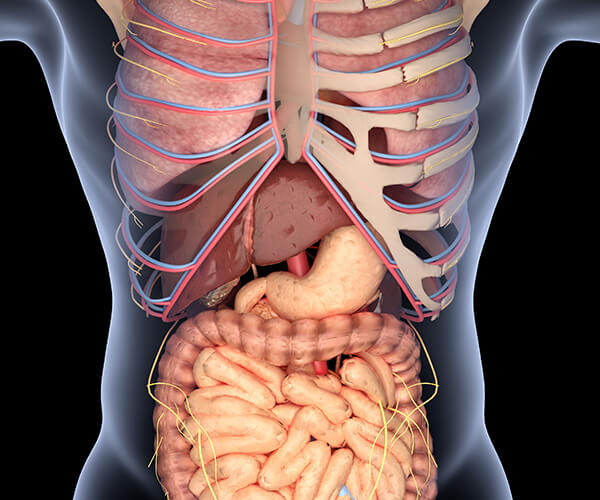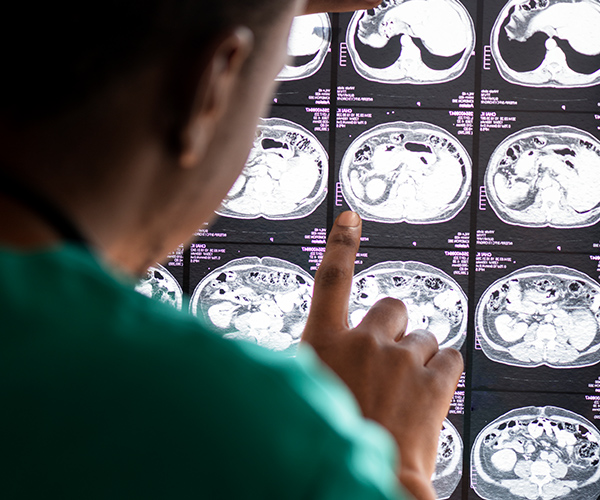What is hepatocellular carcinoma?
Hepatocellular carcinoma is a common disease
Cancer is the second most common cause of death worldwide and liver cancer is the second most common cause of cancer death. It accounted for 788,000 deaths in 2015 according to the World Health Organization: http://www.who.int/news-room/fact-sheets/detail/cancer. Hepatocellular carcinoma (HCC) is the most common type of liver cancer accounting for approximately 90% of all liver cancers, with average survival rates between 6 and 20 months.

Causes of HCC
Development of HCC is closely associated with chronic liver disease. Most patients (70% to 90%) with HCC suffer from concurrent cirrhosis, a condition in which the liver does not function properly due to long-term damage. In liver cirrhosis the normal liver is replaced by scar tissue. A cirrhotic liver is characterized by chronic inflammation and scar tissue. Research has shown that chronic inflammation facilitates HCC development. Inflammation and scar tissue formation predispose the liver to develop premalignant cells, which subsequently evolve into cancer cells.
Infections such as chronic hepatitis B and/or hepatitis C are the main causes of HCC worldwide. Hepatitis B vaccination reduces the risk for HCC. Other causes include alcohol consumption and food containing aflatoxin B1, a potent cancer provoking substance that is a common contaminant of peanuts, corn, and other grains stored in hot and humid climates. Additional conditions associated with an increased risk for HCC include fatty liver disease, diabetes, obesity, and metabolic syndrome. Use of tobacco products also is associated with an increased risk of HCC. In contrast, coffee consumption has been associated with reduced risk for HCC. In general, HCC is more common in older, male patients and in patients with a family history of HCC.

Symptoms of HCC

Most people don’t have signs and symptoms in the early stages of HCC. When signs and symptoms of HCC appear, they may include general weakness and fatigue, abdominal pain or tenderness, especially in the upper right part of the abdomen, swollen abdomen (ascites), nausea and vomiting, loss of appetite, unexplained weight loss, yellow skin or eyes (jaundice), light stools, and easy bruising or bleeding.
Diagnosis of HCC

The diagnosis of HCC is sometimes difficult and frequently requires various tests and procedures. These include blood tests, imaging tests, and removing a sample of liver tissue for testing. The most commonly used blood test for HCC is a tumor marker named alfa-fetoprotein (AFP). AFP levels greater than 400-500 ng/ml are considered diagnostic for HCC but less than half of patients have levels that high. The most common imaging tests used for the diagnosis of HCC are ultrasound, computerized tomography (CT) scan, and magnetic resonance imaging (MRI).
Staging of HCC

Once HCC is diagnosed, it is important to determine how widely spread the disease is, as treatment options depend on the stage of HCC. Determining the extent of the disease spread is called staging. Staging is usually performed with imaging studies such as CT, MRI and bone scans.

Therapy of hepatocellular carcinoma
Therapy of HCC depend on the size and location of the tumor, how well the liver is functioning, and the overall health of the patient. Treatments for HCC include:
- Surgery. Surgery to remove the cancer and a margin of surrounding healthy tissue is an option for patients with early-stage HCC who have normal liver function.
- Liver transplantation. Removal of the liver containing HCC and replacing it with a liver from a donor is an option in healthy patients whose HCC has not spread beyond the liver.
- Destruction of HCC with extreme heat or cold. Procedures to kill the cancer cells in the liver using extreme heat or cold may be recommended for patients for whom surgery is not appropriate. These treatments include radiofrequency ablation, cryoablation, and ablation using alcohol or microwaves.
- Chemotherapy or radiation delivery directly to the cancer. A catheter is first passed through the patient’s blood vessels into the liver. Chemotherapy drugs (chemoembolization) or tiny glass spheres containing radiation (radioembolization) are then directly delivered to the cancer cells.
- Radiation therapy. Radiation therapy uses energy from X-rays or protons may be used if surgery is not an option. Stereotactic body radiotherapy (SBRT) consists of focusing many beams of radiation therapy simultaneously on HCC.
- Targeted drug therapy. Targeted drugs may help slow the progression of the disease in patients with advanced HCC. Sorafenib (Nexavar®) and lenvatinib (Lenvima®) are indicated for first line treatment of HCC, i.e. for patients who have not yet received any systemic treatment for HCC. Regorafenib (Stivarga®) is indicated for second line treatment of HCC, i.e. for patients whose HCC has progressed while receiving either sorafenib or lenvatinib.
- Cancer immunotherapy. Cancer immunotherapy is a treatment that stimulates or restores the ability of the patient’s immune system to fight cancer. Several agents are currently used either alone or in combination to treat HCC.
- TheraBionic P1: The TheraBionic P1 delivers low levels radiofrequency electromagnetic fields (radiowaves), which selectively block the growth of HCC cells and do not affect normal cells. This treatment is indicated for patients whose advanced HCC has progressed while receiving first line and second line therapies. It also is indicated for patients who do not tolerate first line and second line therapies for advanced HCC.
- Clinical trials. Clinical trials give patients a chance to try new liver cancer treatments. This is how the safety and effectiveness of new treatments are evaluated and new treatments are developed. It always is advisable to ask your physician whether you are eligible to participate in a clinical trial.
